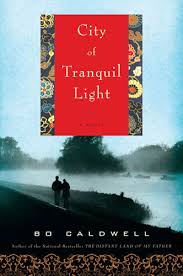 One of the reasons that we read fiction is to escape to another time or place. Historical fiction has the ability (if well-written) to take us away to a world that we can only read about and dream about. Bo Caldwell’s latest novel City of Tranquil Light caught my attention for this reason. The story is set mostly in China, as the main characters are missionaries there during the early 1900s.
One of the reasons that we read fiction is to escape to another time or place. Historical fiction has the ability (if well-written) to take us away to a world that we can only read about and dream about. Bo Caldwell’s latest novel City of Tranquil Light caught my attention for this reason. The story is set mostly in China, as the main characters are missionaries there during the early 1900s.
Will Keihn, the main character, is also the primary narrator of the story. The story begins with him looking back upon his life in China. He says, “Some say the cities in the North China Plain are by and large alike, one indistinguishable from another; to them this one might look like any other. But it is not; I can testify to this, for it is the place on this earth that I love the most, the city in which my wife and I lived for nearly twenty-five years among beggars and bandits and farmers and scholars and peasants, people whom we loved dearly. The name of the city is Kuang P’ing Ch’eng—City of Tranquil Light—and although I now reside in southern California and have for many years, that faraway place remains my home.”
Will then takes us back to his youth on a Mennonite farm in the rural United States and how he felt called to go to China as a missionary—young and shy and uncertain, yet sure of his faith and his call. On the way, he meets his wife, Katherine, a nurse who is going to China to join her sister and brother-in-law in serving the Chinese. Will falls in love first and slowly wins Katherine’s heart, and they are married in China and soon move away to set up their own mission.
For Bo, the story is a return to China. Her first novel, The Distant Land of My Father, was also set in historic China and was based upon the story of her uncle. This novel also grew out of family history—her grandparents were missionaries to China. Bo had her grandfather’s memoir to read, as well as the biographies and autobiographies of other missionaries to China, including that of Gladys Aylward, whose biography was a favourite of mine when I was growing up.
Bo says, “When I began the novel in 2002, I tried to understand my grandfather’s faith and to present it accurately. I tried to see the world through his eyes. Then life intervened.” Bo quit drinking and was diagnosed with breast cancer and went through chemo and radiation before returning to her writing “a different person. The combination of sobriety and a serious illness had affected my faith deeply, and I was no longer writing about my grandparents’ faith. I was writing about my own.” That depth shines through the novel, in both Will and Katharine. The novel is never preachy; it is a story of two simple, humble people who obeyed God and lived their faith to the max.
Will’s narrative of the events of his life is interspersed with segments from Katharine’s diary, balancing and adding to his account. I loved the two perspectives, the way that Bo slipped into the voices of each character and made them come alive. She also must have spent an incredible amount of time researching the novel, for that shines through in the details. She doesn’t just tell us that Katherine treated a host of illnesses; she lists those illnesses, from worms to trachoma to wounds. Those details make China of the 1900s come alive for the reader.
City of Tranquil Light is a beautiful, touching novel that makes me want to read Bo’s first book, to return to China and the stories woven by this skilled storyteller.
I received this book for review courtesy of the publisher. This post contains affiliate links; as an Amazon Associate, I earn from qualifying purchases.

No Responses Yet